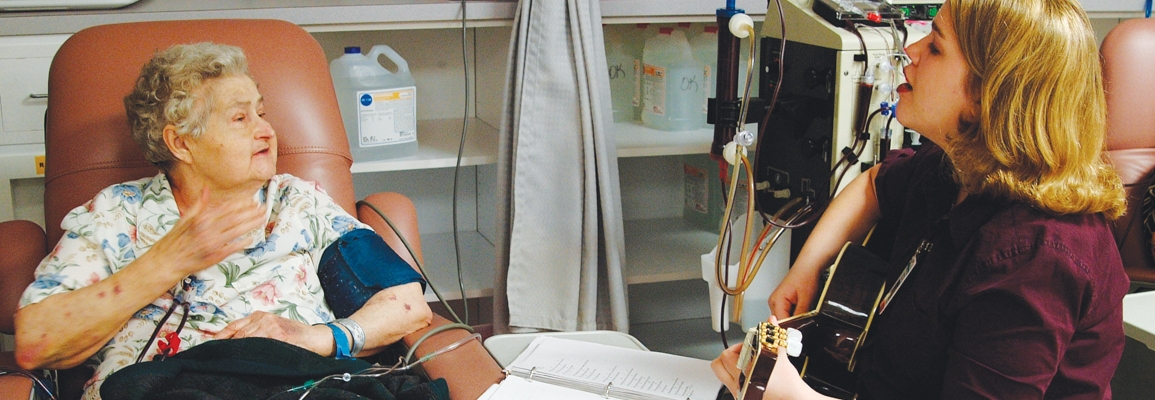The Bachelor of Music in Music Therapy degree provides skilled musicians with opportunities to develop expertise to use music within a therapeutic relationship to meet the physical, mental, emotional, and spiritual needs of individuals as board-certified music therapists.
The program's approximately 60-65 undergraduate students come to Appalachian from throughout the U.S. and serve the region and nation in professional health care and special education settings.
Fast Facts
- Academic courses and clinical training begin in the freshman year with observation of music therapy as a requirement of the first music therapy courses.
- Beginning sophomore year, students provide weekly music therapy sessions to a group from a different clinical setting in the community each semester, all under the direct, on-site supervision of a board-certified music therapist.
- Nearly 100 percent of program graduates have passed the national board certification exam and achieved job placement in music therapy
- Alumni are leaders in professional health care, special education, and private practice settings throughout the U.S.
Admissions
In addition to the general Appalachian State University application, any student interested in being considered as a music major, regardless of degree program, must audition successfully before the Hayes School of Music faculty.
Those applying for admission to the Music Therapy program must also participate in an interview with program faculty. See audition requirements.
Costs
Appalachian offers an outstanding education at a great price. See why national publications consider us a "best value."
Music Scholarships
Classes
Classes in the Music Therapy program include the School of Music's core curriculum: private instrument/voice study, ensemble participation, music theory and aural skills, music history, world music, and other musicianship classes.
Additionally, students in the degree study specific music therapy techniques and theory in order to demonstrate the Professional Competencies established by the American Music Therapy Association. Students learn to address clinical goals for people of all ages and types of challenges through music experiences. These experiences may involve the client's active participation in creating music such as through singing, playing instruments, songwriting, or improvisation or receptive engagement in music through imaging, listening, or moving to music.
Successful completion of the degree, including a required 1,020-hour internship at one of more than 50 affiliated sites across the country, prepares students for the examination administered by the Certification Board for Music Therapists, Inc.
More information
- Programs of Study
- A four-year course plan and other details are found in the Hayes School of Music Student Handbook.
- Course descriptions and advising information are found in the Undergraduate Bulletin under the Hayes School of Music.
Program Faculty
The Music Therapy faculty includes experts with diverse clinical and research emphases. Program faculty have authored numerous publications and have served the profession at state, regional, national, and international levels.
The full-time faculty members are
- Dr. Laura Brown, Undergraduate Program Director
- Dr. Melody Schwantes, Graduate Program Director
- Prof. Laurelle Cartwright
- Dr. Christine Leist
- Prof. Katurah Christenbury
They are supported by additional board-certified music therapists who serve as adjunct faculty and clinical supervisors.
See the school's full faculty and staff listing.
Careers
Nearly 100 percent of program graduates of Appalachian's Bachelor of Music in Music Therapy degree program pass the national board certification exam and achieve job placement in music therapy.
Alumni are leaders in professional health care, special education, and private practice settings throughout the U.S. and serve in leadership roles in the state, regional, and national music therapy associations.
Get Help
- All students in this degree program complete an internship in affiliated clinical and educational sites nationwide. Program faculty provide advising and support through the internship application process.
- More about music careers
